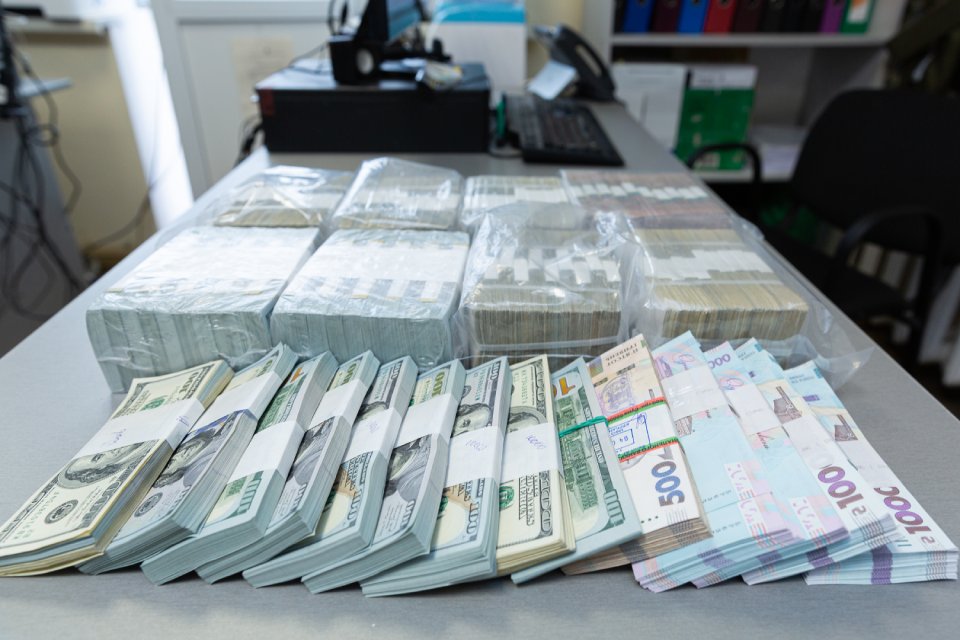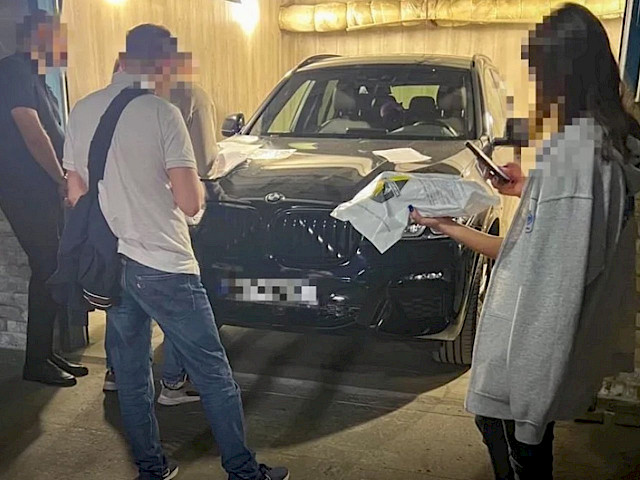
ILLEGAL ENRICHMENT
Illegal enrichment of MP's and high-ranking officials undermines public trust in the government and reinforces the perception of officials seeking to amass wealth beyond their legitimate financial means. The National Anti-Corruption Bureau of Ukraine and the Specialized Anti-Corruption Prosecutor's Office are taking efforts to eliminate this disgraceful phenomenon.
In August 2024, the head of the Antimonopoly Committee of Ukraine was served with a notice of suspicion of illegal enrichment. Investigators established that between 2020 and 2023, while serving as the head of a regional state administration, the suspect acquired 21 real estate properties and a luxury vehicle, registering these assets with his wife’s relatives. The assets in question include seven apartments in Kyiv and Uzhhorod, a house near Kyiv with an area of over 220 square meters, two land plots, two garage units, six parking spaces, three commercial premises, and a BMW X3. The discrepancy between the total value of these assets and the combined income and savings of the official and his wife amounted to UAH 72.1 million. The crime was uncovered with the assistance of investigative journalists from Radio Svoboda.
Another case involves the illegal enrichment of a member of the Ukrainian parliament. Between 2021 and 2022, she acquired assets worth over UAH 20 million, which she later used to purchase a house in the Odesa region. However, her official income and savings for this period were no more than UAH 2.7 million.
Both suspects were also charged with misstatements, as the mentioned assets were not disclosed in their annual declarations.

CORRUPTION AT KHARKIV TAX SERVICE
This case is unique because, during the pre-trial investigation, detectives documented and exposed three levels of intermediaries. Thanks to the plea agreement mechanism, NABU and SAPO brought the scheme's curator to justice.
In the winter of 2024, the head of a unit at the Main Department of the State Tax Service in Kharkiv region encouraged a representative of a private company to pay USD 55,000 to the executives of the Main Department, including its acting head. The bribe was meant to remove the company from the list of taxpayers classified as high-risk. Its transfer was facilitated through two intermediaries: a subordinate of the unit head and a Kharkiv-based entrepreneur.
The unit head was served with a notice of suspicion in February 2024. Thanks to the meticulous efforts of detectives and prosecutors, sufficient evidence was gathered to charge the intermediaries as well. The investigation of these persons resulted in guilty verdicts.
In May 2024, the head of the division was officially charged, and in July 2024, the scheme’s curator—the Main Department's head—was also served with a notice of suspicion.
In December 2024, the investigation in the case was completed.
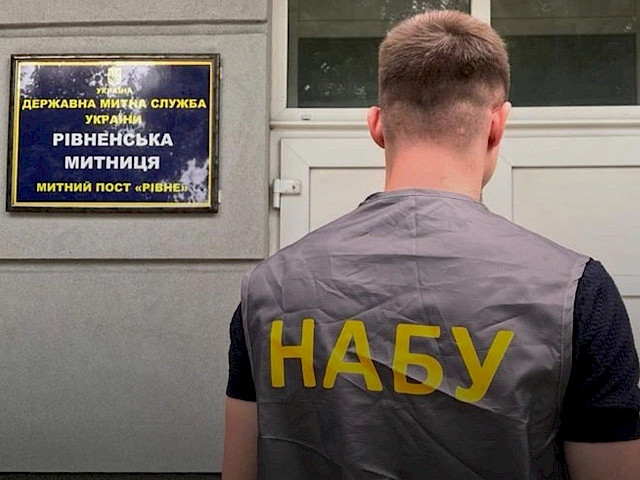
CORRUPTION AT CUSTOMS
Corruption in customs poses a major threat to the country’s economy, as such crimes lead to billions of hryvnias in state budget losses. From attempts to install “the right people” in key positions to large-scale corruption schemes, each case represents a danger that NABU and SAPO work to identify and dismantle.
The second half of 2024 began with the exposure of deep-rooted corruption at the Rivne Customs Office. A department head, in collusion with other officials from the State Customs Service of Ukraine, orchestrated a scheme to receive bribes for “assisting” companies in clearing customs without obstacles. Using his position, he ensured the clearance of goods at significantly reduced tariffs.
One of the most high-profile cases involved an attempt by a group of individuals to place “their people” in leadership positions at regional customs offices. They offered USD 1 million for the position of head of Lviv Customs, USD 500,000 for Volyn Customs, and USD 200,000 for Chernivtsi Customs. The group expected that in return, the leadership of the State Customs Service would “overlook” corruption schemes at the named customs offices in exchange for half of the illicit proceeds.
At Volyn Customs, two officials were caught facilitating the illegal movement of Apple products through the international checkpoint “Yahodyn” without proper customs payments, causing over UAH 53 million in state losses. Detectives documented eight instances of deliberate inaction on illegal goods movement, document falsification, and the entry of false data into the customs clearance system.
A scheme to illegally import electronics through Lviv Customs was uncovered in cooperation with the Security Service of Ukraine in the Lviv region. The goods crossed the border under forged documents without any customs duties being paid. Following the scheme’s exposure, the goods were seized, transferred to the Asset Recovery and Management Agency, and sold, fully compensating for the inflicted losses.
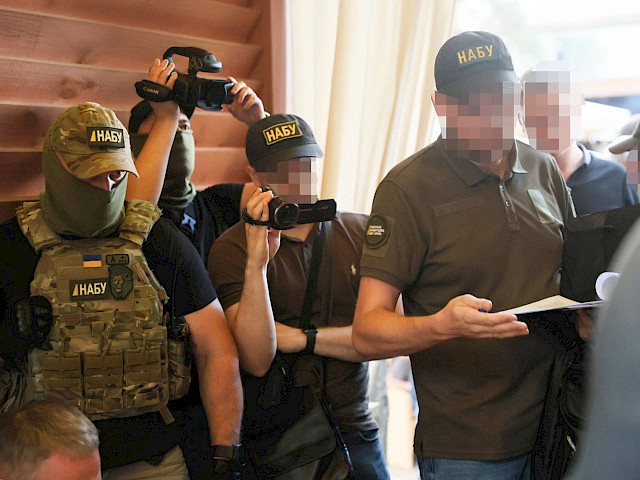
CORRUPTION IN ENERGY SECTOR
NABU and SAPO continue fighting corruption in the energy sector. One of the most audacious and cynical cases in the history of anti-corruption agencies was the exposure of the Deputy Minister of Energy, who was caught demanding a USD 500,000 bribe. The high-ranking official, in collusion with the heads of two state-owned coal enterprises from the East and two other persons extorted this sum from the head of another coal company in the western region for facilitating the transfer of mining equipment from frontline mines to his enterprise. Essentially, the scheme involved profiting from efforts to save valuable equipment.
Another case involves coal supply scheme that resulted in nearly UAH 12 million in losses for a state-owned energy producer. The persons behind the fraud were a former deputy minister of energy, a former MP, the beneficiary of a private company, and the director of the state enterprise "Ukrvuhillia."
Equally egregious was the embezzlement of state funds during the procurement of transformer equipment for JSC "Kharkivoblenergo." Members of an organized group inflated the cost of the energy equipment by UAH 132.5 million, with some components priced five times higher than their actual value. However, they managed to misappropriate only UAH 12.5 million before external circumstances, including the imposition of martial law, forced them to halt. Following procedural actions by NABU detectives at "Kharkivoblenergo," the perpetrators ultimately abandoned their criminal plans. Seven persons became suspects in the case.

CORRUPTION AT PROSECUTOR'S OFFICE
Prosecutors, who are entrusted with defending the state's interests, sometimes find themselves on the wrong side of the law. This half-year, at least two of them were not only prosecuting cases in court but also enriching themselves illegally.
In the summer, NABU and SAPO charged a prosecutor of the Prosecutor General's Office with inciting a USD 170,000 bribe for closing a criminal case. The crime was uncovered with the involvement of undercover detectives.
Another case involves the deputy head of the Zaporizhzhia Regional Prosecutor's Office, who was caught in September receiving USD 40,000. The money was demanded for changing the jurisdiction of a criminal case, lifting the seizure of property, and ensuring that an individual would not be held accountable.`
As of the end of the reporting period, both cases remained at the pre-trial investigation stage.
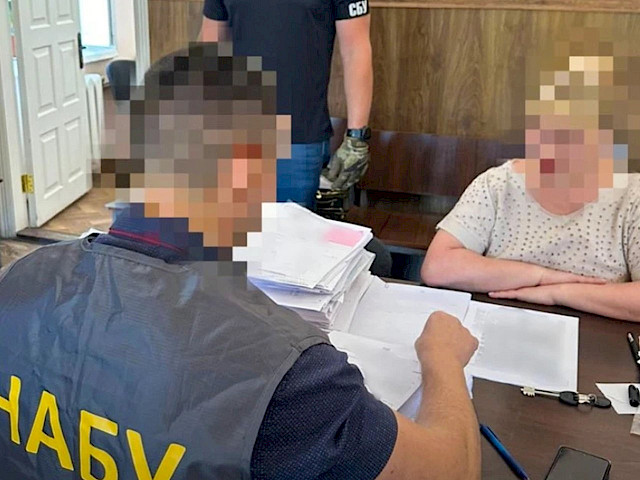
JUDICIARY CORRUPTION
In the second half of 2024, anti-corruption authorities exposed the head of a specialized court of general jurisdiction for the first time. The case involves both the sitting and former chairmen of the Commercial Court of the Lviv Region, who extorted USD 1 million from a representative of a private company. In exchange, they promised to ensure that the necessary rulings were made by the Western Commercial Court of Appeal. Additionally, they pledged to prevent the murder of a whistleblower, which was allegedly planned by his opponents in a legal dispute. During the investigation, detectives and prosecutors documented the transfer of a part of the undue advantage in the amount of USD 75,000.
NABU and SAPO expanded the list of suspects in a case involving the illegal departure of conscription-age men from the country to evade mobilization. A judge from a district court in the Odesa region assisted in this scheme by issuing fraudulent court rulings. These rulings falsely stated that a child’s place of residence was with the father, which allowed men to use this as a legal basis to leave Ukraine. The cost of such "services" ranged from USD 1,500 to USD 3,500. Between 2022 and 2023, the court issued over 1,000 such rulings. The judge was exposed in January 2024, and on July 30, charges were filed against five of his accomplices.
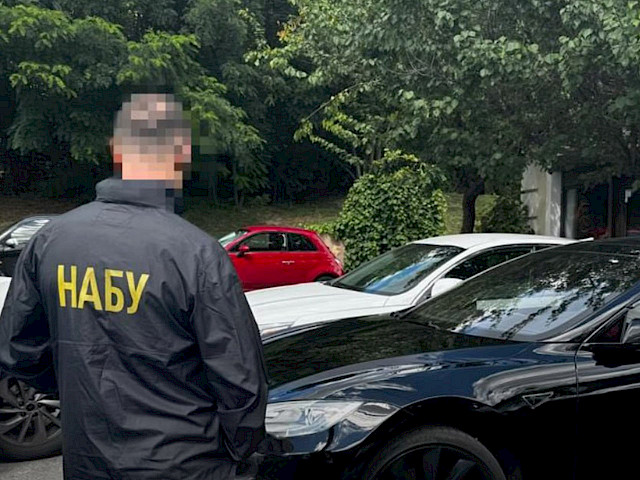
CORRUPTION IN DEFENSE SECTOR
Alongside the heroic efforts of Ukraine’s defenders, some officials exploit the country’s critical needs for personal enrichment. In the second half of 2024, NABU and SAPO uncovered several corruption crimes in the defense sector.
Officials from two structural units of the Armed Forces of Ukraine’s Logistics Forces ensured that pre-selected companies won tenders for aviation components. More competitive commercial offers were deliberately distorted or ignored altogether. As a result, contracts were signed under unfavorable conditions, leading to an overpayment of UAH 27.3 million.
Another case involved the embezzlement of UAH 12 million during the procurement of dynamic protection elements for armored vehicles. Scheme participants, including the head of a state enterprise and the chief accountant, artificially inflated costs. Despite having the necessary components in stock, they falsified documents to show a fake purchase from a commercial entity, which justified the illegal transfer of state funds. As a result, UAH 12 million in losses were incurred, with the money funneled into controlled accounts for further laundering.
NABU and SAPO also uncovered an accomplice in a case involving the procurement of overpriced personal protective equipment during russia’s full-scale aggression. The head of the Security Department at PJSC "NEC Ukrenergo" facilitated the purchase of body armor from a company that lacked proper licenses and sold the vests at double the market price. This scheme caused over UAH 10.3 million in damages to the state. The accomplice coordinated with representatives of the energy company and other institutions and was directly involved in the distribution of vests.
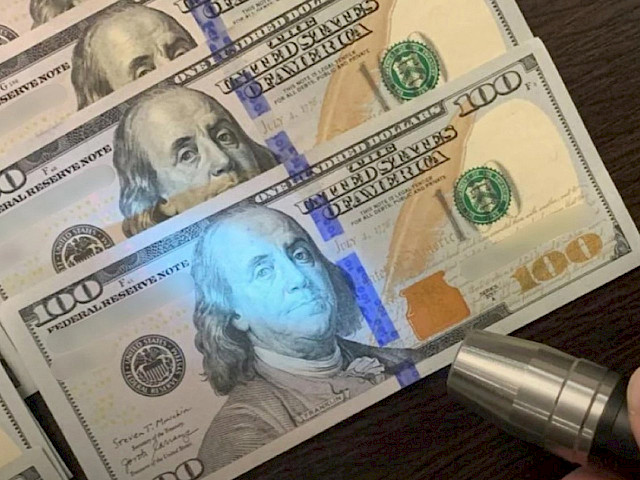
LAND SCHEMES
Land corruption remains a serious issue for Ukraine, particularly when officials abuse their positions for personal gain. NABU and SAPO continue exposing schemes involving the illegal appropriation of land resources.
In the second half of 2024, the former acting head of the Main Directorate of the StateGeoCadastre in the Zhytomyr region was notified of suspicion. In 2021, he illegally terminated the permanent rights of an agricultural enterprise to nearly 5,000 hectares of land. Despite numerous court decisions in favor of the company, the official canceled the registration of state assets and tried to transfer the land to another legal entity. As a result, the enterprise suffered losses exceeding UAH 54 million. The investigation into the scheme was completed in October 2024.
Another case of land corruption was uncovered in the Dnipropetrovsk region. In early 2024, a private company sought to lease a 19-hectare forest plot for recreational purposes. After several rejections, a company's representative was approached by a deputy head of the regional state administration, offering to facilitate the long-term lease approval in exchange for a USD 200,000 bribe. He was notified of suspicion under Part 4, Article 368 of the Criminal Code of Ukraine.
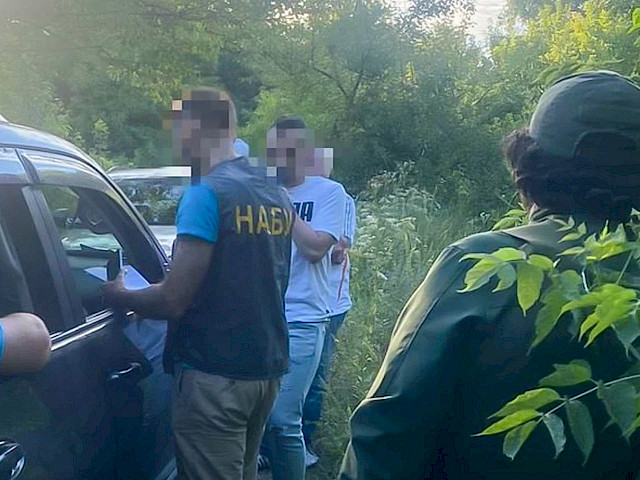
FRONTLINE INFRASTRUCTURE
Despite russia’s full-scale aggression and the presence of enemy forces on Ukraine’s borders, some officials continue engaging in corrupt activities.
In the second half of 2024, NABU and SAPO exposed an MP of IX convocation and his accomplice—a former acting deputy head of the Criminal Investigation Department of the National Police and ex-head of the Strategic Investigations Unit in Sumy region—for soliciting an undue benefit.
In March 2024, the MP approached the head of a village council in the Sumy region, demanding a kickback in exchange for not interfering with a tender for the repair of a water supply system in the Okhtyrka district. The bribe amounted to 10 percent of the contract value, with an additional 4 percent earmarked for local law enforcement officers to ensure they would not obstruct the allocation of funds. According to the investigation, the total kickback reached UAH 3.4 million.

ROAD CONSTRUCTION CORRUPTION
The "Great Construction" program has been one of the government’s flagship projects, with billions of hryvnias allocated for roads. However, the ambitious initiative did not escape controversy and became the focus of a major corruption scandal.
In September 2024, NABU and SAPO exposed a large-scale corruption scheme in road construction within the Dnipropetrovsk Regional State Administration. The former head of the Dnipropetrovsk RSA, his deputy, the head of the department, the head of the road infrastructure division, and the director of a business entity were all notified of suspicion.
In 2022, wartime legislation prioritized funding for road maintenance, while expenditures on current and capital road repairs were allowed only as a last resort.
The suspects falsified documentation, replacing references to current and capital repairs with urgent operational maintenance, thus securing priority funding.
The cost of this maintenance was artificially inflated to UAH 1.5 billion. Contracts were then awarded to a company affiliated with the head of the Dnipropetrovsk RSA, which overpriced materials by more than UAH 286 million.
Currently, five individuals are under suspicion, the investigation is ongoing.
